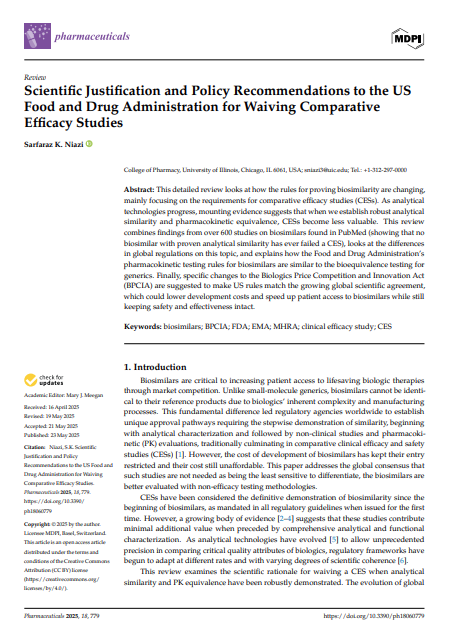Scientific Justification And Policy Recommendations To The US Food And Drug Administration For Waiving Comparative Efficacy Studies
May 2025

Scientific Justification and Policy Recommendations to the US Food and Drug Administration for Waiving Comparative Efficacy Studies
Sarfaraz K. Niazi
College of Pharmacy, University of Illinois, Chicago, IL 6061, USA; [email protected]; Tel.: +1-312-297-0000
Abstract: This detailed review looks at how the rules for proving biosimilarity are changing, mainly focusing on the requirements for comparative efficacy studies (CESs). As analytical technologies progress, mounting evidence suggests that when we establish robust analytical similarity and pharmacokinetic equivalence, CESs become less valuable. This review combines findings from over 600 studies on biosimilars found in PubMed (showing that no biosimilar with proven analytical similarity has ever failed a CES), looks at the differences in global regulations on this topic, and explains how the Food and Drug Administration’s pharmacokinetic testing rules for biosimilars are similar to the bioequivalence testing for generics. Finally, specific changes to the Biologics Price Competition and Innovation Act (BPCIA) are suggested to make US rules match the growing global scientific agreement, which could lower development costs and speed up patient access to biosimilars while still keeping safety and effectiveness intact.
Keywords: biosimilars; BPCIA; FDA; EMA; MHRA; clinical efficacy study; CES
Academic Editor: Mary J. Meegan
Received: 16 April 2025
Revised: 19 May 2025
Accepted: 21 May 2025
Published: 23 May 2025
Citation: Niazi, S.K. Scientific Justification and Policy Recommendations to the US Food and Drug Administration for Waiving Comparative Efficacy Studies.
Pharmaceuticals 2025, 18, 779.
https://doi.org/10.3390/ph18060779
Copyright: © 2025 by the author.
Licensee MDPI, Basel, Switzerland.
This article is an open access article distributed under the terms and conditions of the Creative Commons Attribution (CC BY) license
(https://creativecommons.org/licenses/by/4.0/).
Download reference for more details.